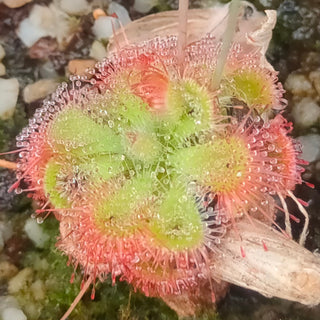Saintpaulia
TRAILING AFRICAN VIOLET
- Unit price
- / per
Saintpaulias, commonly known as African violets, are herbaceous perennial flowering plants, native to Africa. Typically, the African violet is a widely cultivated household indoor plant, but can also be an outdoor plant.
Trailing African Violets form large plants with foliage that trails downwards and outside of their pots.
The African violet is a day-neutral plant regarding flower development.
The plants get their common name "African violet" from their superficial resemblance to true violets (viola).
The genus (saintpaulias) is named after Baron Walter von Saint Paul-Illaire (1860-1910), the district commissioner of Tanga province who discovered the plant in Tanganyika (now Tanzania) in Africa in 1892.
The genus is most closely related to Cape Primrose (Streptocarpus).
Seeds per packet: 10
Note: These seeds are extremely tiny! It's just how they naturally are. Reading glasses are recommended to aid with seeing them, even for those who don't normally require glasses to read. The seeds are shipped in a wax envelope. Open carefully, and sprinkle onto the growing medium. Do not bury the seeds.
Surface sow as light aids germination. Water the seeds in. Keep continuously moist. Temperature 20-22 C, 68-72 F. Seeds germinate in 20-60 days, though some could take up to 90 days.
Saintpaulia
TRAILING AFRICAN VIOLET
- Unit price
- / per
Multiple secure payment options available.
Adding product to your cart
You may also like
Saintpaulias, commonly known as African violets, are herbaceous perennial flowering plants, native to Africa. Typically, the African violet is a widely cultivated household indoor plant, but can also be an outdoor plant.
Trailing African Violets form large plants with foliage that trails downwards and outside of their pots.
The African violet is a day-neutral plant regarding flower development.
The plants get their common name "African violet" from their superficial resemblance to true violets (viola).
The genus (saintpaulias) is named after Baron Walter von Saint Paul-Illaire (1860-1910), the district commissioner of Tanga province who discovered the plant in Tanganyika (now Tanzania) in Africa in 1892.
The genus is most closely related to Cape Primrose (Streptocarpus).
Seeds per packet: 10
Note: These seeds are extremely tiny! It's just how they naturally are. Reading glasses are recommended to aid with seeing them, even for those who don't normally require glasses to read. The seeds are shipped in a wax envelope. Open carefully, and sprinkle onto the growing medium. Do not bury the seeds.
Surface sow as light aids germination. Water the seeds in. Keep continuously moist. Temperature 20-22 C, 68-72 F. Seeds germinate in 20-60 days, though some could take up to 90 days.
















































